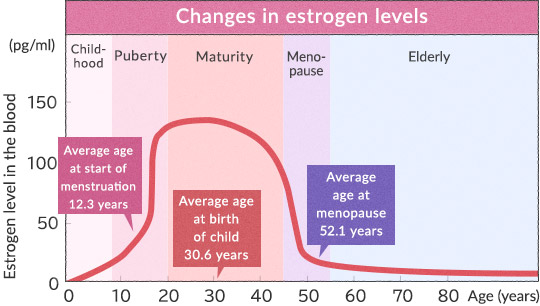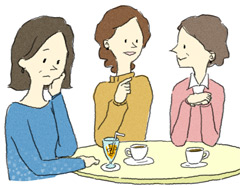About menopause
Generally speaking, menopause is a time of natural physical changes that every woman will experience. It marks the end of menstruation and typically lasts about ten years, usually between a woman's mid-40s and early-50s.
Changes in the balance of hormones
There are several points during the female life cycle when a woman's physiological rhythm changes. The female hormone estrogen has a great deal to do with the physical changes that occur at these points - the onset of menstruation, pregnancy, childbirth, and menopause. Hormones secreted by the ovaries bring about the changes in the female body that come with puberty marked by the beginning of the menstrual cycle, and then sexual maturity, when a woman is able to get pregnant and give birth.
Specifically, the change in estrogen concentration in the blood is closely related to life cycle. After adolescence, the concentration peaks as the body reaches sexual maturity, and then decreases significantly during menopause.

Menopause does not have a very good image, but there are ways of managing it that can make this period of your life easier and more comfortable. We explore some of them here.
Signs of menopause

Although usually occurring between the ages of 45 and 55, the age at which individual women go through menopause varies a great deal.
The timeframe during which each woman experiences physical changes and mood swings also varies. One physical sign that you may be going through menopause is an irregular menstrual cycle.
During menopause, the menstrual cycle becomes irregular, with monthly periods lasting longer or shorter amounts of time and changes in menstrual blood loss. If you feel that your periods and cycle are different now than they have been in the past, this could be a sign that your body may soon undergo the hormonal changes that come with menopause.
- Autonomic imbalance symptoms
-
- Hot flashes
- Hot flashes, abnormal sweating, dizziness
- Emotional symptoms
-
- Physical weariness, depression, insomnia
Menopause is not the only cause of menstrual irregularity. Women who experience menstrual irregularities are advised to visit an obstetrician-gynecologist (OB/GYN) to rule out other causes for the change.
View here for more information on the main symptoms of menopause.
Learn more about how to deal with menopause on the Menopause lab site (Japanese)







